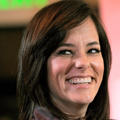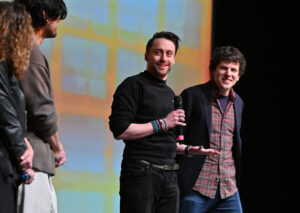Park Posey at Cinema Cafe for the TimesTalks panel. Photo by Jemal Countess/Getty Images.
Eric Hynes
Erstwhile Indie Queen, sardonic girl next door and trailblazer for a generation of quirked-out Emmas, Kats and Zooeys — Parker Posey’s reputation precedes her. She first came to Sundance in 1995 with Party Girl, the film that introduced the world to her unique blend of crush-worthy beauty and self-effacing comedic chops. And she last swept through Park City when she served as a juror for the US Dramatic Competition in 2010. In the intervening years, she became regular fixture at the Festival, and watched her career expand in tandem with the profile of American independent film. She’s back at this year’s Festival with Price Check, in which she plays a beguiling, high-energy executive for a failing supermarket—classic shabby chic Posey. She’s also agreed to host the Festival’s Awards Ceremony on January 28.
Dubbed “The Queen of the Indies” by Time Magazine in 1997, Posey exemplified what the movement bestowed upon the culture: a smart, accessible alternative to the Hollywood mainstream — offbeat as life choice, rather than affect. The business has since changed into a more modest version of its booming ‘90’s counterpart. And in the past 15 years Posey has worked in Hollywood (You’ve Got Mail, Superman Returns) as much as Indiewood (Personal Velocity, Fay Grim).
Despite any forays into big studio filmmaking, Posey maintains an unambiguously independent mind. Speaking freely, frankly, and directly, she’s humble about her own career and passionate about the industry in which she works, expressing both optimism and concern about the future of American cinema and culture. The state of indie film has changed over the years, but Parker Posey remains a constant – a dazzlingly bright light who continues to embody its integral spirit, remaining defiantly, disarmingly herself.
You’re coming back to Sundance this year with a new film, Price Check, and you’re also hosting the Sundance Festival Awards Ceremony. Yet you can’t exactly call it a comeback. You’ve visited the festival pretty steadily over the years.
I’ve come maybe seven times. And I’m so excited they finally asked me to host the thing! But it’s weird, people think I’m there all the time. Like I’m the mayor or something. They’re like, “You’re the queen of Sundance, you’re here every year.” I’m like no, I haven’t been there [with a film] in 6 years. But there’s this impression that I’m always there, which is funny.
It shows how much people identify you with the festival and with independent cinema. Even when you’re not there, it seems like you’re a part of it.
If only I had more work in actual independent films. I was there at the height of it, before it got sponged by the corporate system. So it’s kind of heartbreaking to go back and feel that it’s changed. I mean, I was even there for Josie and the Pussycats one year. Sundance became a venue for all sorts of movies. It just got so big. Festivals in general all got so big. Sorry, we don’t have to have this conversation.
No, please, let’s.
I think it’s interesting that we haven’t been able to support the auteur. Like Eric Mendelsohn, who made Judy Berlin and 3 Backyards, which was at the Festival when I was on the jury a few years ago. He’s the real deal, that guy. That he got in and had a platform to speak, this man who teaches at Columbia—that’s great. With what Sundance has become, that’s an achievement. It doesn’t mean people are going to see your film, or understand it, but Sundance gives that platform to the filmmaker.
In the last year or two, I have felt that the Fest has boomeranged back to being a bit more about the films and filmmakers. The flipside of the industry crisis is that the Festival can be a little bit more like it used to be.
What happened was that indie movies had gotten to the point where they started to make money, and some indies were getting made by producers and financers, and that’s when I saw the work go to A-list actors and celebrities. But now movies aren’t making money. That’s no secret. They’re not making money. So now we can go back to being more experimental, and maybe we can have conversations about it again, be more authentic. I think the whole Occupy Wall Street message is really about the individual. About not being judged by how much money you make. Hopefully there is more to this. Because you know what? I really like movies about human beings, I’m tired of laughing at people pooping and throwing up, and being gross, and I want to hear a new voice. I want to see something more human and charming, and I don’t want to see people try to shock or provoke me.
When I was on the jury in 2010, I was really worried about it. I was crossing my fingers that I would see some movies that would inspire me, and that I would recognize the unique voice of the filmmaker. Can a filmmaker still make that kind of movie? Something like Three Backyards and Winter’s Bone, and Sympathy For Delicious, which I thought was really creative. I was happy to see a few films that I felt had that voice, because I still think film is the most powerful medium our culture has.
Festivals at this point seem to be shifting beyond functioning as a launch for films destined to have a theatrical life to being a platform for actually seeing films in a theater, because you don’t know when that’s going to happen going forward.
And now we’re going to be watching movies on our computers. You can lie down with your computer and have your head on a pillow and watch something. It’s become intimate again. More intimate than sitting in an audience with desensitized twenty-somethings who are texting, who aren’t there to share an experience of watching a movie with a group of people.
I remember seeing that District 9 movie and it scared the shit out of me, and there were a bunch of twenty year-olds texting, almost exercising their ability to not be moved. I think it has to do with gaming, where the culture is saying this is how we see our screen now. It’s a tool to make money. HD is about great quality in order to watch a movie that looks like a video game, so that you’ll buy it and participate in it. It doesn’t have to do with landscapes, with subtlety. It’s a transition that our culture is going through. The people that are financing things think this is what people want. They want it louder. But if that’s going on, there has to be room for the opposite, for the quiet, subtle movies.
How much do you think about managing your career at this point, or do you simply look for parts that interest you? It almost seems like the entire industry has gotten over the idea of hard and fast distinctions between mainstream, independent, TV and film, high and low. I thought you were great in last year’s Inside Out, the WWE-produced thriller starring wrestler Triple H, in which you memorably kicked a tombstone.
(Laughs) I did my own stunt for that film! Running from the explosion, with burning embers falling all around. I mean, it was just a job. The times when it’s really authentic are rare. But you don’t have to be so precious. Everything I do doesn’t have to be so precious. I know someone who has a 15-year-old, and 15-year-olds are not into just one thing. It’s snowboarding, skateboarding, art, rap, hip-hop, house—it’s really spread out, and you don’t have to categorize it.
An indie movie doesn’t have to have this kind of music in it, or this kind of storyline, this kind of tone. Something like Little Miss Sunshine comes on the scene and everyone imitates it for 15 years. Or they try to. But also the movies just got bad. And I’m not going to spend money on something bad. It’s not the early ‘80s, when Sophie’s Choice came out, and so many people in America ran to the theater to see these great performances. It makes me a little nervous. I’ll be honest.
It makes you nervous in a cultural sense?
Yeah, because movies are supposed to be an exercise of compassion, intelligence, and humanity. And if those movies aren’t made, then our culture will suffer. If it’s all about money, and the art isn’t going to be supported, then places like Sundance will cease to be a platform for them. It’s such a different time right now. We’ve yet to see what that looks like for cinema.




